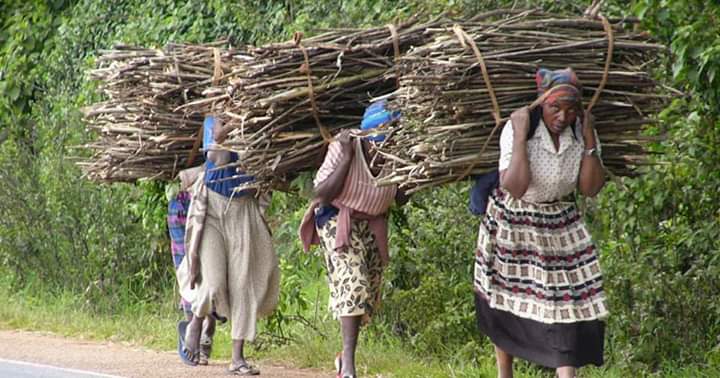
Mmayen who hails from Uyo Local Government Area is a mother of four. Her husband suffers from protracted illness. Mmayen wakes up as early as 4am everyday besides weekend to prepare her children for school. She undertakes this routine so as to be rightly disposed to move to villages as far as Ini, Ikono, Mkpat Enin among other parts of the State in search for fruits to buy for her retailing fruit business. She will have to return early from the morning market thus be able to cater for her sick husband before moving to her market stall. Most times, she does not have the time to eat the food she prepares at home. Her concern is to get to the market early to make sales that will help in the upkeep of the family.
The effort of Mmayen must have reminded you of a glowing description of a capable wife by a man called Lemuel some thousands of years ago. The description is recorded in the Bible in Proverbs chapter 31. The woman whose merits he extolled was certainly busy. She looked after her family, traded in the marketplace, bought and sold, made clothes for her household, and worked on her farmland.
This woman was not taken for granted. Proverbs 31: 10-28 says ‘Her children call her blessed, and her husband praises her.’ Such a wife is a treasure. The Bible says, “She is worth far more than rubies.”
Since Lemuel’s time, women’s work has become, if anything, more complicated. Their 21st-century role often requires them to be wives, mothers, nurses, teachers, breadwinners, and farmers—all at the same time. Just like Mmayen quoted earlier, countless women make heroic sacrifices just to ensure that their children have enough to eat. Do not all these women too deserve appreciation and praise?
Women as Breadwinners
Today more women than ever have to work outside the home to help support their family or are the sole support of their family. The book Women and the World Economic Crisis notes a report that stated: “Domestic work is not the only work women do. There are relatively few women anywhere in the world who can claim to be ‘just a housewife.’” And women’s work is rarely glamorous. Although media may depict women as executives in plush offices, the reality is usually very different. The vast majority of women toil long hours for scant material reward.
Thousands of women especially in rural areas work on the farmland, cultivating crops, tending small family plots, or caring for livestock. This labour—usually underpaid or unpaid—feeds most families.
When women do have paid employment, they usually earn less than male workers, simply because they are women. This discrimination is a particularly bitter pill to swallow for a mother who is the family’s only breadwinner, a role that is becoming more and more common. A 2016 United Nations report estimates that between 30 and 50 percent of all households in Africa, depend on a woman as their main provider. And even in the Nigerian cities, an increasing number of women have had to become the main provider.
Rural poverty throughout much of the developing society is accelerating this trend. A husband who finds it a constant struggle to feed his family may decide to move to a nearby city or even another State and sometimes country to obtain work. He leaves his wife behind to care for the family. If he is fortunate enough to find a job, he sends money home. But despite his good intentions, this often does not continue. The family he has left behind may sink deeper into poverty, and their well-being now depends upon the mother.
This vicious circle, aptly described as the “feminization of poverty,” throws an enormous burden on thousands of women. “Households headed by women, estimated to be one-third of the total worldwide, are many times more likely to be poor than those headed by men, and the number of such households is increasing,” explains the book quoted earlier Women and the World Economic Crisis. But difficult as it is, putting food on the table is not the only challenge women face.
Mothers and Teachers
A mother also has to care for the emotional welfare of her children. She plays a vital role in helping a child learn about love and affection—lessons that may be just as important as satisfying his physical needs. In order to develop into a well-balanced adult, a child needs a warm, secure environment while growing up. Once again, a mother’s role is crucial.
In the book The Developing Child, Helen Bee writes: “A warm parent cares about the child, expresses affection, frequently or regularly puts the child’s needs first, shows enthusiasm for the child’s activities, and responds sensitively and empathically to the child’s feelings.” It is humane and of course the society certainly expects children who have received such warmth from a caring mother to show their appreciation.
Through breast-feeding, many mothers provide a warm environment for their child right from birth. Especially in poor households a mother’s own milk is an invaluable gift she can give to her newborn. Interestingly, besides feeding and cherishing her children, the mother is often their principal teacher. It is mainly the mother or grandmother who patiently teaches the child to speak, to walk, and to do household chores and countless other things.
Wellspring of Compassion
One of the greatest gifts that women can give their families is compassion. When a family member falls sick, the mother takes on the role of nurse, while still caring for all her other responsibilities.
A mother’s compassion may even motivate her to eat less herself so that her children do not go without food. Many have found that some women view their food intake as sufficient even though they are malnourished. They are so accustomed to giving the larger share to their husbands and children that as long as they can still work, they consider themselves adequately fed.
Sometimes a woman’s compassion expresses itself in her concern for her society. That society matters to her, since she also suffers when crisis impoverish the land. In 1929 women from Ikot Abasi local government area organized a massive revolt against policies imposed by the British colonial administrators in southeastern Nigeria, touching off the most serious challenge to British rule in the history of the colony. Their revolt attracted the desired attention. That protest later known as Aba women riot remains historical reference point for women struggle for the advancement of the society they belong.
Despite several decades that have elapsed, women struggle for the society has not withered. The February 25th 2018 protest led by women of Adiadia Community of Uruan local government area of Akwa Ibom State, against what was tagged illegal operation of an oil company in their community is a case of reference to the numerous recent struggles women have undertaken for the betterment of the society they belong.
Yet despite their hard work in so many areas, many women rarely get credit for what they do. How can they even now improve their lot in life? Also, is there any chance that attitudes toward them will change? What are the future prospect for women?
What Does the Future Hold for Women?
“THE history of mankind is a history of repeated injuries and usurpations on the part of man toward woman.” reads the Seneca Falls, New York, Declaration of Sentiments. This was penned over 170 years ago as a protest against injustice toward women.
Progress has undoubtedly been made since then, but as the United Nations publication The World’s Women 2015 states, there is still a long way to go. “Too often, women and men live in different worlds,” it reports, “worlds that differ in access to education and work opportunities, and in health, personal security and leisure time.”
Increased awareness of this has led nations and States to pass laws to protect the rights of women. In Akwa Ibom State alone, the Widowhood and Child Right Law has been a major reference point to one of the laws that protect women.
Nevertheless, laws cannot change hearts, where the roots of injustice and prejudice lie. For example, law itself does not prevent violence. “My experience reveals violence against womenfolk to be a widespread problem despite several laws made against it,” states a Woman who suffers from domestic violence. According to her, “ Our laws are inadequate for stopping such violence—unless present cultural and social values change.”
“Cultural and social values” are usually based on deep-seated tradition—a hard nut to crack. “Tradition makes men believe that women should be used rather than loved, worked rather than cared for,” says a woman from Uyo. “As a result, a woman has no voice, no rights, and little chance to improve her situation.
Another woman, Louis Michael says her menace of barrage revolves around how discouraging treatments are given to the womenfolk when they push themselves to thrive. According to her ” when a man works as the head of a company and exudes all the qualities as required of him, members of staff will say he’s a strong man, he knows his onions, he is eligible and efficient.
” A woman on the other hand, who exudes the same qualities will be called bossy, mean, proud and domineering. A man buys a car, he’ll be called hardworking, a lady does same, she’ll be called prostitute.”
What then can be done to improve the lots of women in the society?
Way Forward
A Feminist, Imaobong Akpan opines that the solution lies in men becoming more vocal for oppressed women. According to her, if injustice to one is injustice to all, and women seem to be the only visible faces and audible voices over gender disparity and discrimination, It will be only be appropriate for the baton of responsibility to be extended to the men folk.
She adds ” Every man has a mother, some have wives, daughters and sisters. The hurt of these feminine beings should be their hurt. Let men show more commitment to the physical, social, legal protection of women in the society. ”
She says her dream is to see an average Akwa Ibom son, a Nigerian man, an African male figure make the well-being of the African sisters a habitual priority. Akpan stresses that when that is done, mutual love and respect would be deepened and the society will be made a better place.
Opinion on the way forward varies. Thus on the International Women’s Day celebration which had the theme, ” Press for Progress” and held on Friday 8th March 2018, in a keynote address, the Keynote Speaker, Prof Comfort Ekpo who served the University of Uyo as a Vice Chancellor noted that women cannot sit on the fence and expect their rights to be respected.
She said for the right of women to be respected, it is imperative the women ” must rise to press for progress”. What does pressing for progress mean? She explains ” Our women must be hardworking and enterprising. No man will be willing to relinquish his position. You must show evidence of capacity in any position you find yourself. Push to serve in positions the men serve and never disappoint”.
Ekpo offers insight to the fact that although tremendous progress has been made in Akwa Ibom State over rights of women, women’s right to own bequeathed properties is far from being respected. She said it was time parents change the narrative.
While dovetailing the assertion of Comfort Ekpo, the Wife of the Akwa Ibom State Governor, Mrs Martha Emmanuel advised that the girl child should embrace education to make her realize her rights and be rightly disposed to pursue it.
For the Akwa Ibom State Governor, Mr Udom Emmanuel, women have received greater recognition in his administration. He says the recognition is exemplified in the appointment and election of women to serve in various capacities in his administration. He said that to protect the women against violence of any form, his administration will not fail to wield the big stick against those who rape women.
” Rape and all forms of violence against women must stop. Our daughters do not need to be put through such trauma”. Governor Udom assures.
While the government work to protect the rights of women, the society still has much to contribute.
“Give Her the Reward She Has Earned”
Whether in the role of breadwinner, mother, teacher, or wellspring of compassion, a woman is worthy of respect and recognition, as is her work. She should not only be celebrated on International Women’s day or similar occasions. Women who press for progress deserve all-round celebration. The wise man Lemuel, who spoke so highly of a capable wife, valued both a woman’s work and her counsel. In fact, the Bible at Proverbs 31:1 explains that his message was largely derived from instruction his mother had given him. Just as the family of Mmayen quoted at the beginning of this piece do not take her effort for granted, Lemuel was convinced that a conscientious wife and mother should not be taken for granted. “Give her the reward she has earned,” he wrote. “Her works bring her praise.”—Proverbs 31:31.




